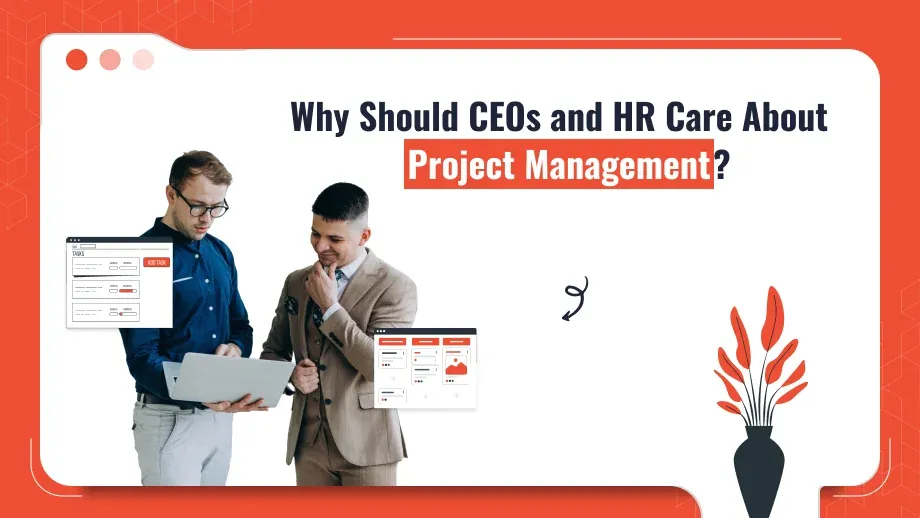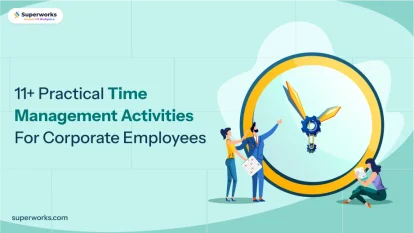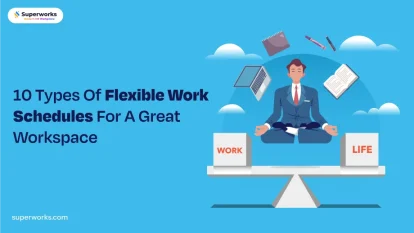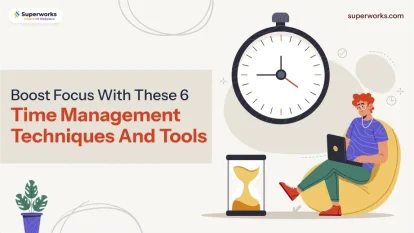The top tools are Super Project Asana, Monday.com, and Trello. These tools offer functions such as project assignment, progress monitoring as well as team collaboration that make them suitable to manage projects and keep an eye on the business objectives.
Grab a chance to avail 6 Months of Performance Module for FREE
Book a free demo session & learn more about it!
-
Will customized solution for your needs
-
Empowering users with user-friendly features
-
Driving success across diverse industries, everywhere.
Grab a chance to avail 6 Months of Performance Module for FREE
Book a free demo session & learn more about it!
Superworks
Modern HR Workplace
Your Partner in the entire Employee Life Cycle
From recruitment to retirement manage every stage of employee lifecycle with ease.


Seamless onboarding & offboarding
Automated compliance & payroll
Track performance & engagement
Why Should CEOs and HR Care About Project Management?
- PM tasks
- 7 min read
- October 4, 2024

- Why Should CEOs and HR Care About Project Management?
- Why CEOs and HR Should Understand PM tasks
- Key PM Tasks for CEOs
- Key Project Management Tasks for HR Professionals
- Bridging the Gap Between CEOs and HR in Project Management
- Conclusion: Ensuring Effective Project Management for CEOs and HR Professionals
Why Should CEOs and HR Care About Project Management?
The Project management may seem to be an area that is primarily to PMs who are dedicated or department heads. But HR managers and CEOs are essential to ensure that the PM tasks meet the goals of the business and that employees are fully engaged. For executives, knowing the role of PMs can help them lead the organisation’s growth, take informed decisions and manage their resources efficiently. For HR professionals taking advantage of project management tools aids in streamlined recruitment employees, development of employees, as well as work culture programs.
The article will look at the particular specific project management tasks aspects that are most important to HR managers and the CEO as well as how they could improve overall business results in a variety of ways, from improved effectiveness to increased satisfaction with employees.
Why CEOs and HR Should Understand PM tasks
The CEO’s Role in Project Management
The CEO is responsible for everything from the top-level strategies to the day-to-day operation of an organisation. But, managing projects gives the CEOs an organised strategy to make sure that the corporate’s goals are carried out without interruptions or overruns of budget. The CEOs who are aware of the PM will be able to take better informed decisions about which PM tasks to prioritise and how to allocate funds efficiently.
An example: A chief executive who is focused on growing may employ PM tasks tools to keep track of the progress of new product launches, making sure that every department is on the same page and the milestones are achieved.
HR’s Role in Project Management
HR specialists may not consider themselves project managers, however most HR jobs are massive initiatives that have deadlines and budgets as well as teams. From setting up innovative HR processes to onboarding and education programs, HR must manage these initiatives with precision so that they can ensure their success. Through embracing techniques for managing projects HR managers can more effectively keep track of progress, enhance utilisation of resources and optimise employee experiences.
An example: If HR launches a brand new training program for the entire company the framework for project management (PM tasks) will ensure that the training program is in line starting with scheduling and budgeting, and also keeping track of employee engagement and their feedback.
Key PM Tasks for CEOs
1. Setting Clear Project Objectives
One of the biggest duties of a chief executive is establishing clear and clear targets for key initiatives. If PM tasks don’t have clear objectives, they may drift off course or be unable to follow a clear path. Directors must ensure that the results of the PM tasks coincide with the business’s strategy and vision, and that each team members know the definition of success.
- What is important: Specific goals help unite efforts across departments, making it easier to assess the effectiveness of projects.
2. Resource Allocation and Budgeting
The other major responsibility that CEOs have when managing PM tasks is to approve and supervising the use of resources, which includes budgets as well as the human capital. The CEO must manage many PM tasks, while making sure the proper allocation of resources for them to progress without the risk of putting other areas in danger.
- Best practice: CEOs to organise regular reviews to monitor resource use and to ensure that budgets aren’t over-budget.
3. Risk Management
CEOs should be prepared and anticipate potential risky projects that may impact the performance of their company in general. Through collaboration with the project manager, they are able to spot high-risk areas and devise contingency plans and ensure that the business can be agile, even if PM tasks encounter unexpected challenges.
- An example: A CEO who is launching an innovative product line might require a supply chain management plan to prevent disruptions by preparing alternate source options ahead of time.
Maximize Resource Allocation – Experience Cutting-Edge PM Tools!
Effectively manage resources to ensure projects stay on track and within budget.
Key Project Management Tasks for HR Professionals
1. HR Project Initiation and Planning
HR initiatives, like initiatives to recruit employees, initiative to engage or even restructuring, require the most careful plan. HR managers must establish clearly defined timelines, budgets and deliverables so that they meet their targets without disrupting the daily routine.
- Example: If HR announces the launch of a new talent acquisition system the planning process includes selecting the right vendor, creating timelines as well as identifying training requirements for employees already in the system.
2. Managing Teams and Resources
HR typically oversees resources within the company, such as employees and consultants from outside. Monitoring deadlines, tasks, and their progress is crucial in order to make sure that the appropriate employees are doing what they need to in the appropriate time. Project management tools such as Gantt charts as well as Kanban boards offer the most precise picture of who’s working on what task, which can help HR keep track of progress and prevent delays.
- Example: in a new benefits rollout HR will know which departments are responsible for distributing the modifications, administering benefits as well as handling questions from employees.
3. Communication and Change Management
Communication is crucial when it comes to HR projects, specifically PM tasks that need changes throughout the organisation. HR managers must inform project participants about progress and updates effectively in order to keep all stakeholders aware and keep employees involved. This is why developing a change management plan is crucial, particularly when it comes to dealing with resistance of employees towards new systems or policies.
- Best practice: Establish platforms for communication where the stakeholders are able to inquire about issues and receive periodic information.
Bridging the Gap Between CEOs and HR in Project Management
Aligning Goals
HR and CEOs need to work closely together in order to ensure that the projects are aligned with the larger business goals. Through collaboration early in the process and throughout the duration of the PM tasks, HR can tailor initiatives which drive business objectives regardless of whether they are through recruiting and employee engagement or changes to workplace rules.
Regular Communication
Both HR and the CEO should set up formal communication frameworks to review the progress of important initiatives on a regular basis. They could be as simple as weekly updates sessions, comprehensive reports or quick checks-ins that address the issues that come up.
In the end, effective project management for HR professionals and CEOs is sharing a common vision. The projects must not just adhere to budgets and deadlines, they must additionally support the long-term goals like the growth of the company, retention of employees and creating a healthy workplace.
Conclusion: Ensuring Effective Project Management for CEOs and HR Professionals
The concept of project management doesn’t only apply to committed PMs. CEOs and HR managers must be sure they are in alignment with the company’s goals, effective use of resources and achievement of important initiatives. Through understanding the fundamental aspects of PM tasks and making use of project management software as well, CEOs and HR are able to significantly enhance the way their teams function and help propel the business to the next level.
A well-organized project management process plays an important role in daily operations as well as longer-term growth. The challenge for CEOs is coordinating PM tasks to achieve strategic objectives and making sure resources are utilized effectively. In the case of HR personnel, it’s all about controlling PM tasks centered around people that affect the recruitment process, engagement of employees, and the culture of work. Through mastering the fundamental aspects of PM tasks that are covered in this piece the CEOs as well as HR managers can achieve better outcomes, boost efficiency and facilitate smoother operation.
FAQs
What are the most effective tools to manage projects for HR managers and CEOs?
What HR departments can do to make sure that project work is in alignment with corporate goals?
HR departments can coordinate projects by making sure that the company's goals are clearly communicated including key people in their planning and using tools to monitor performance metrics. Regular reviews can help to ensure that projects are in line with strategic goals.
What are the most common issues encountered when managing projects that span multiple functional areas, and what can be done to mitigate them?
Problems can arise from lack of communication, conflicts in goals, and siloed teams. They can be overcome with transparency in communication, collaboration across departments as well as using a unison tool for managing projects to monitor the progress of teams.
How important is risk management for CEOs who manage the project?
Management of risks helps CEOs identify the possibility of obstacles, which helps ensure a more efficient project execution. Through identifying risk in advance, executives can plan their resources effectively, prevent delay and limit costs.


